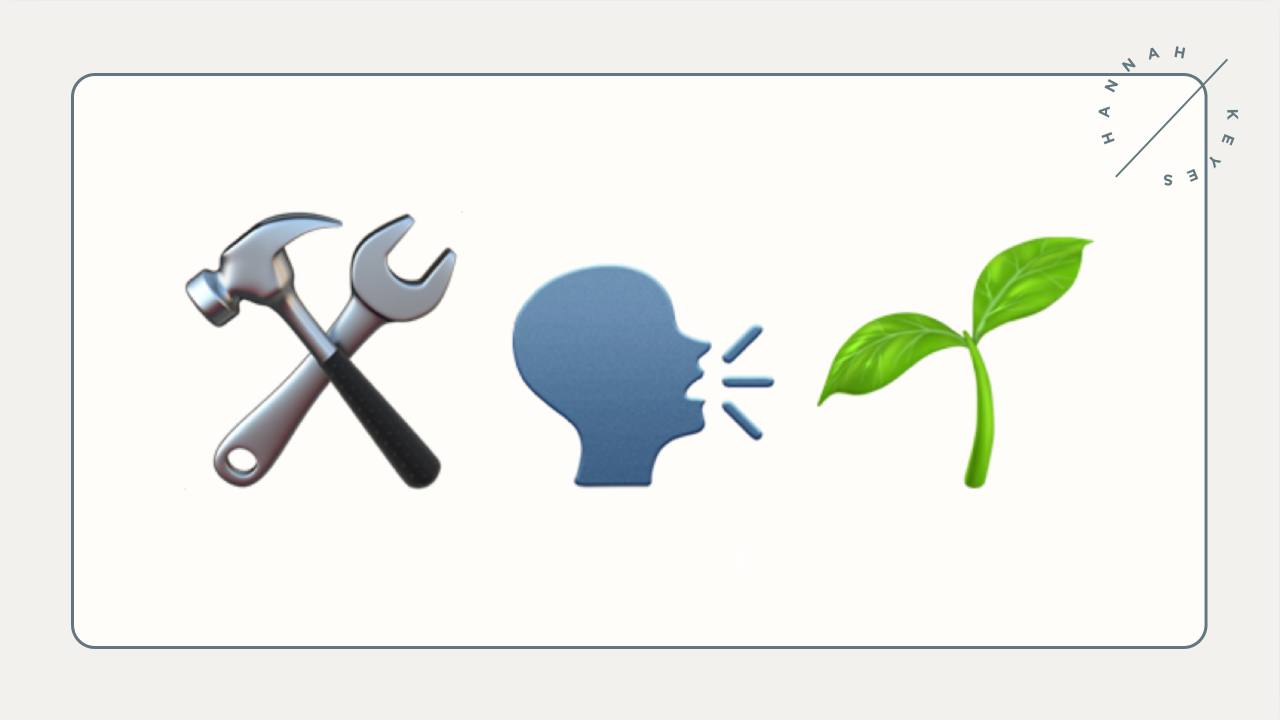tiny ripples, tiny teeth, and the not-so-tiny purpose of pauses
I've been updating my first digital product, Tech for Boundaries, for the latest iOS 18 update over the last couple weeks (I'm behind on getting it out because I'm a maximalist and have almost doubled the page count adding new resources 🙈)
The process has called attention to where I need to update my own focus modes since it's been a few years; highlighting how much my routines and personal systems have shifted.
Not in massive ways but how little bits add up over time to reveal new patterns.
💊 A new medication schedule here.
🚶♀️ Increased movement there.
🌞 Seasonal weather changes incoming.
Sometimes our routines get updated intentionally and with conscious experimentation, refinement, and choice...
But sometimes life changes because of one choice and our routines take on ripple effects that are a natural progression but less obvious.
It's a common pattern for us as humans—also life in general.
Evolving.
Adapting.
If I could go back and tell my past burnt out self that meeting your needs, even in the smallest ways, can have such big ripple effects I think it could have really helped.
But I don't have a time machine so I learned the hard way.
Though I am glad I know now and thankful that I can share to help others.
Knowing this has shifted my perspective in moments of fear and overwhelm to that of grace, patience, and awe where I had often struggled to find it.
Because I didn't become the best equipped, rested, and resourced version of myself (to-date anyway) overnight or from a single big action.
It has been the culmination of years of small changes, leaps of faith, and moments of courage that helped build to this moment.
Ever Evolving
The first time I ever heard of managing energy was the spoon theory, which is likely the case for most people and still the best introduction to the subject out there.
The second time I heard about energy management was reading the book, The Power of Full Engagement by Jim Loehr and Tony Schwartz that was written in 2003.
It's a great book that breaks down the fundatmental and early days of burnout support for corporate folks in the early aughts.
It, along with my own early work in energy management, still had an underlying goal of constant optimization for high performance then.
As I started recovering from burnout and accepting my limitations, I realized I had to redefine success.
Optimization couldn't equal success or be the goal of my life.
Will energy management help you have more sustainable high performance?
YES.
Is sustainable high performance your definition of success?
Well, that's a question only you can answer.
Whether it's cozy coloring, awe walks, learning to crochet or craft, many of my clients, friends, and acquaintances (myself included) are discovering that finding awe and joy in the little things—through intentional pauses—is what makes the pressures of this late-stage capitalism survivable... alongside those we want to spend time doing it with.
They are also the first things society tells us we have to give up in order to achieve success—and many of us did give them up. Only to learn that sacrificing small joys didn't make productivity patterns better or more achievable.
Raise your hand if any of these sound familiar:
Eating lunch at your desk
Being strategic about how often you take bathroom breaks
Starting early to get ahead
Stay late to get things things finished
Finishing one last thing from the backseat on a roadtrip to your own elopement
(No? Just me on the last one... that's fair 🙃)
I don't point these out to say they are inherently negative. So much of life has neutral meaning until it becomes overextension, overconsumption, undervaluing rest, or undersupporting ourselves.
I was talking with a client last week about the realities of energy management and how even it can be used to fantasize a world where "if you just manage your energy better" you can have a sustainable workload and live. When the reality is that we live in a world where not every day can be an ideal schedule (at least without an absolute crap ton of privilege.)
Knowing your ideals and needs for most of us is more about being well informed to make the best decision when you ultimately have to make a choice between two things. The key word here being choice—because you can't choose an option you don't know exists.
Back when I was in corporate, I was technically making choices but I never allowed my needs to be an option in the decision. I didn't even recognize them as options because I was so disconnected from what they were.
Anyone who does that long enough is likely to end up burnt out.
I definitely did.
But this is real life and there will still be days you need to start early or work on a Sunday (hey there hey, that's me today!) We're just trying to avoid doing it at the expense of sanity and wellbeing.
As I've built and updated my own personal systems over the years and helped other entrepreneurs do the same, I found that the way I talked about my work needed to shift.
I realized that my Thoughtful Systems methodology was more of a philosophy—a way of living.
From that rabbit hole emerged a more refined framework from the notion that energy management isn't about perfecting our patterns, but protecting our capacity (and ability) to respond to them called:
The WEAL Method
For too long productivity has been a prescription-based, one-size-fits-all solution that tells us what to do and where to fix ourselves with rigid rules that were never intended to actually help people feel or work better.
Where personal productivity should be a permission-based framework that helps us:




